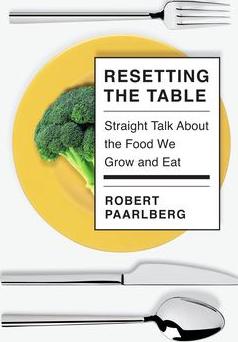
Resetting the table : straight talk about the food we grow and eat
A bold, science-based corrective to the groundswell of misinformation about food and how it's produced, examining in detail local and organic food, food companies, nutrition labeling, ethical treatment of animals, environmental impacts, and every other aspect from farm to table. Consumers want to know more about their food--including the farm it came from, the chemicals used, the nutrition value, how the animals were treated, and costs to the environment. They are being told that organic foods, unprocessed and sourced from small local farms, do the best in passing such tests. Robert Paarlberg reviews the evidence and disagrees. He finds that global food markets have improved our diet, and that "industrial" farming has recently turned green, thanks to GPS-guided precision methods that are now cutting energy use and chemical pollution. America's serious obesity crisis does not come from farms, or from food deserts, but instead from "food swamps" created by food companies, retailers, and restaurant chains. Animal welfare is lagging behind, but progress can be made through continued advocacy, more progressive regulations, and perhaps plant-based imitation meat. Paarlberg finds solutions that can make sense for farmers and consumers alike. From Farm to Table is a road map through the rapidly changing worlds of food and farming, laying out a practical path to bring the two together
Available Copies by Location
| Location | |
|---|---|
| Victoria | Available |
Browse Related Items
- ISBN: 9780525656449
- Physical Description 354 pages : illustrations ; 25 cm
- Edition First edition.
- Publisher [Place of publication not identified] : [publisher not identified], 2020.
Content descriptions
| General Note: | Includes index. |
| Formatted Contents Note: | Chapter 1. The Case Against Modern Farming -- Chapter 2. Food Swamp Nation -- Chapter 3. The Limits of Local Food -- Chapter 4. The Panic for Organic -- Chapter 5. Should Peasants Stay Poor? -- Chapter 6. Rejecting Biotech Food -- Chapter 7. The Fate of Farm Animals -- Chapter 8. The Brave New Future of Food. |
Additional Information
| LDR | 02951cam a2200337 i 4500 | ||
|---|---|---|---|
| 001 | 242788 | ||
| 003 | NFPL | ||
| 005 | 20210127104015.0 | ||
| 008 | 191104s2020 nyua e 001 0 eng | ||
| 020 | . | ‡a9780525656449 ‡q(hardcover) | |
| 035 | . | ‡a(OAUW)403172 | |
| 040 | . | ‡aDNAL/DLC ‡beng ‡erda ‡cDLC ‡dCaOAUW | |
| 082 | 0 | 0. | ‡a338.1/973 ‡223 |
| 100 | 1 | . | ‡aPaarlberg, Robert L. ‡0(DLC)n 81119369 ‡0(NFPL)7824 |
| 245 | 1 | 0. | ‡aResetting the table : ‡bstraight talk about the food we grow and eat / ‡cRobert Paarlberg. |
| 250 | . | ‡aFirst edition. | |
| 264 | 1. | ‡a[Place of publication not identified] : ‡b[publisher not identified], ‡c2020. | |
| 264 | 1. | ‡aNew York : ‡bAlfred A. Knopf, ‡c2020. | |
| 300 | . | ‡a354 pages : ‡billustrations ; ‡c25 cm | |
| 336 | . | ‡atext ‡btxt ‡2rdacontent | |
| 337 | . | ‡aunmediated ‡bn ‡2rdamedia | |
| 338 | . | ‡avolume ‡bnc ‡2rdacarrier | |
| 500 | . | ‡aIncludes index. | |
| 505 | 0 | . | ‡aChapter 1. The Case Against Modern Farming -- Chapter 2. Food Swamp Nation -- Chapter 3. The Limits of Local Food -- Chapter 4. The Panic for Organic -- Chapter 5. Should Peasants Stay Poor? -- Chapter 6. Rejecting Biotech Food -- Chapter 7. The Fate of Farm Animals -- Chapter 8. The Brave New Future of Food. |
| 520 | . | ‡a"A bold, science-based corrective to the groundswell of misinformation about food and how it's produced, examining in detail local and organic food, food companies, nutrition labeling, ethical treatment of animals, environmental impacts, and every other aspect from farm to table. Consumers want to know more about their food--including the farm it came from, the chemicals used, the nutrition value, how the animals were treated, and costs to the environment. They are being told that organic foods, unprocessed and sourced from small local farms, do the best in passing such tests. Robert Paarlberg reviews the evidence and disagrees. He finds that global food markets have improved our diet, and that "industrial" farming has recently turned green, thanks to GPS-guided precision methods that are now cutting energy use and chemical pollution. America's serious obesity crisis does not come from farms, or from food deserts, but instead from "food swamps" created by food companies, retailers, and restaurant chains. Animal welfare is lagging behind, but progress can be made through continued advocacy, more progressive regulations, and perhaps plant-based imitation meat. Paarlberg finds solutions that can make sense for farmers and consumers alike. From Farm to Table is a road map through the rapidly changing worlds of food and farming, laying out a practical path to bring the two together"-- ‡cProvided by publisher. | |
| 650 | 0. | ‡aFood industry and trade ‡zUnited States. ‡0(DLC)sh2008103578 ‡0(NFPL)114583 | |
| 650 | 0. | ‡aFarms ‡0(DLC)sh 85047299 ‡zUnited States. ‡0(DLC)n 78095330 | |
| 650 | 0. | ‡aAgriculture ‡xEconomic aspects ‡zUnited States. ‡0(DLC)sh2007100793 ‡0(NFPL)113252 | |
| 905 | . | ‡uteveraert | |
| 930 | . | ‡aMARCIVE (022023) | |
| 901 | . | ‡a242788 ‡bAUTOGEN ‡c242788 ‡tbiblio ‡sSystem Local | |

